Ford Explorer EV vs Tesla Model Y - Differences and prices compared
Compare performance (340 HP vs 627 HP), boot space and price (34200 £ vs 34300 £) at a glance. Find out which car is the better choice for you – Ford Explorer EV or Tesla Model Y?
Costs and Efficiency:
Price and efficiency are key factors when choosing a car – and this is often where the real differences emerge.
Ford Explorer EV has a minimal advantage in terms of price – it starts at 34200 £, while the Tesla Model Y costs 34300 £. That’s a price difference of around 77 £.
In terms of energy consumption, the advantage goes to the Tesla Model Y: with 13.10 kWh per 100 km, it’s somewhat more efficient than the Ford Explorer EV with 14.50 kWh. That’s a difference of about 1.40 kWh.
As for range, the Tesla Model Y performs hardly perceptible better – achieving up to 622 km, about 20 km more than the Ford Explorer EV.
Engine and Performance:
Power, torque and acceleration say a lot about how a car feels on the road. This is where you see which model delivers more driving dynamics.
When it comes to engine power, the Tesla Model Y has a decisively edge – offering 627 HP compared to 340 HP. That’s roughly 287 HP more horsepower.
In acceleration from 0 to 100 km/h, the Tesla Model Y is decisively quicker – completing the sprint in 3.50 s, while the Ford Explorer EV takes 5.30 s. That’s about 1.80 s faster.
In terms of top speed, the Tesla Model Y performs clearly perceptible better – reaching 250 km/h, while the Ford Explorer EV tops out at 180 km/h. The difference is around 70 km/h.
There’s also a difference in torque: Ford Explorer EV pulls distinct stronger with 679 Nm compared to 493 Nm. That’s about 186 Nm difference.
Space and Everyday Use:
Whether family car or daily driver – which one offers more room, flexibility and comfort?
Both vehicles offer seating for 5 people.
In curb weight, Ford Explorer EV is barely noticeable lighter – 1908 kg compared to 1976 kg. The difference is around 68 kg.
In terms of boot space, the Tesla Model Y offers decisively more room – 822 L compared to 450 L. That’s a difference of about 372 L.
In maximum load capacity, the Tesla Model Y performs evident better – up to 2138 L, which is about 716 L more than the Ford Explorer EV.
When it comes to payload, Ford Explorer EV to a small extent takes the win – 585 kg compared to 472 kg. That’s a difference of about 113 kg.
Who wins the race?
The Tesla Model Y proves to be outperforms in nearly all aspects and therefore becomes our DriveDuel Champion!
Tesla Model Y is the better all-rounder in this comparison.
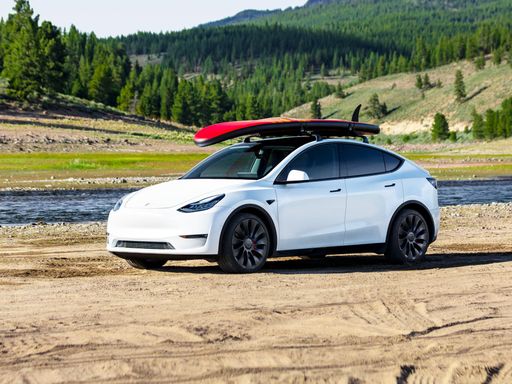
Tesla Model Y
Costs and Consumption
View detailed analysis
Engine and Performance
View detailed analysis
Dimensions and Body
View detailed analysis
Ford Explorer EV
The Ford Explorer EV translates the familiar big‑American SUV presence into whisper‑quiet electric motoring, offering roomy seating and a tech‑forward cabin that will please families and road‑trippers alike. It drives with more composure than its boxy looks suggest, blending a comfortable ride and eager acceleration while undercutting the guilt of gas stops — a practical, modern alternative for buyers who want Explorer space with electric charm.
details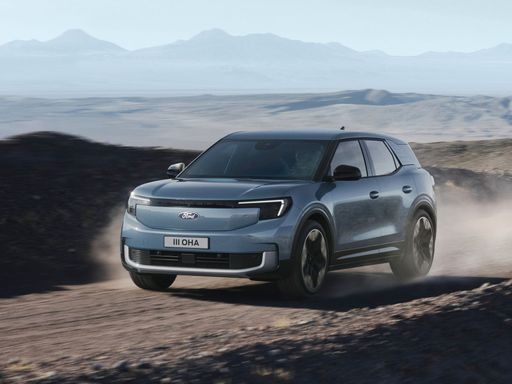
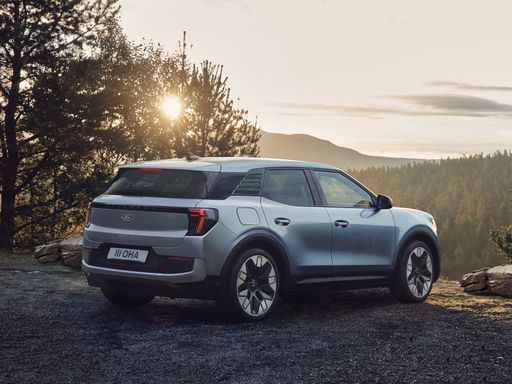
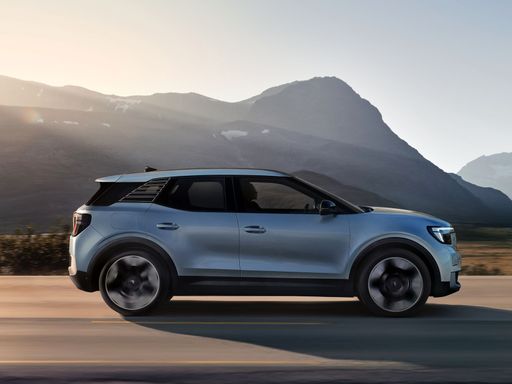
Tesla Model Y
The Tesla Model Y blends SUV practicality with sports-car poke, wrapping a roomy, minimalist cabin and handy hatch into a slick, aerodynamic package that feels more Silicon Valley gadget than garage ornament. It’s an ideal pick for buyers who want effortless electric driving, regular software improvements and access to Tesla’s convenient charging network, though style-conscious shoppers should know it’s more about tech and efficiency than classic luxury.
details
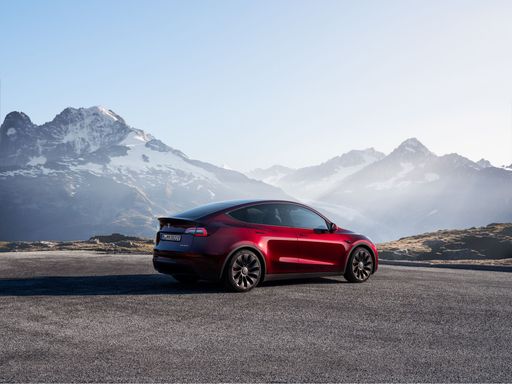
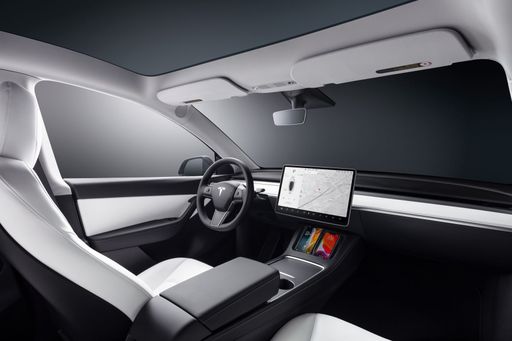
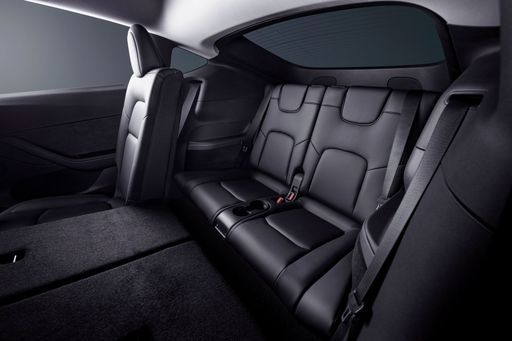

|

|
|
|
|
Costs and Consumption |
|
|---|---|
|
Price
34200 - 48800 £
|
Price
34300 - 53100 £
|
|
Consumption L/100km
-
|
Consumption L/100km
-
|
|
Consumption kWh/100km
14.5 - 17.2 kWh
|
Consumption kWh/100km
13.1 - 16.2 kWh
|
|
Electric Range
360 - 602 km
|
Electric Range
534 - 622 km
|
|
Battery Capacity
52 - 79 kWh
|
Battery Capacity
64.5 - 85 kWh
|
|
co2
0 g/km
|
co2
0 g/km
|
|
Fuel tank capacity
-
|
Fuel tank capacity
-
|
Dimensions and Body |
|
|---|---|
|
Body Type
SUV
|
Body Type
SUV
|
|
Seats
5
|
Seats
5
|
|
Doors
5
|
Doors
5
|
|
Curb weight
1908 - 2179 kg
|
Curb weight
1976 - 2108 kg
|
|
Trunk capacity
445 - 450 L
|
Trunk capacity
822 L
|
|
Length
4468 mm
|
Length
4790 - 4797 mm
|
|
Width
1871 mm
|
Width
1921 mm
|
|
Height
1630 - 1639 mm
|
Height
1611 - 1624 mm
|
|
Max trunk capacity
1417 - 1422 L
|
Max trunk capacity
2022 - 2138 L
|
|
Payload
561 - 585 kg
|
Payload
440 - 472 kg
|
Engine and Performance |
|
|---|---|
|
Engine Type
Electric
|
Engine Type
Electric
|
|
Transmission
Automatic
|
Transmission
Automatic
|
|
Transmission Detail
Reduction Gearbox
|
Transmission Detail
Reduction Gearbox
|
|
Drive Type
Rear-Wheel Drive, All-Wheel Drive
|
Drive Type
All-Wheel Drive, Rear-Wheel Drive
|
|
Power HP
170 - 340 HP
|
Power HP
299 - 627 HP
|
|
Acceleration 0-100km/h
5.3 - 8.7 s
|
Acceleration 0-100km/h
3.5 - 7.2 s
|
|
Max Speed
160 - 180 km/h
|
Max Speed
201 - 250 km/h
|
|
Torque
310 - 679 Nm
|
Torque
420 - 493 Nm
|
|
Number of Cylinders
-
|
Number of Cylinders
-
|
|
Power kW
125 - 250 kW
|
Power kW
220 - 461 kW
|
|
Engine capacity
-
|
Engine capacity
-
|
General |
|
|---|---|
|
Model Year
2024 - 2025
|
Model Year
2025
|
|
CO2 Efficiency Class
A
|
CO2 Efficiency Class
A
|
|
Brand
Ford
|
Brand
Tesla
|
What drive types are available for the Ford Explorer EV?
The Ford Explorer EV is available as Rear-Wheel Drive or All-Wheel Drive.
The prices and data displayed are estimates based on German list prices and may vary by country. This information is not legally binding.
